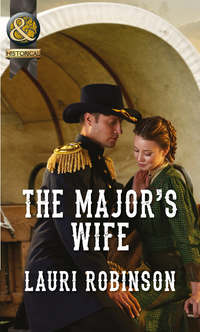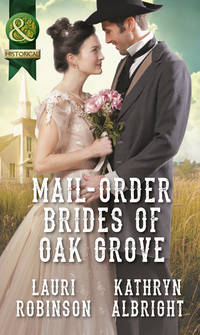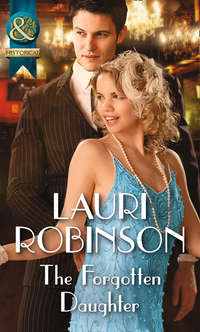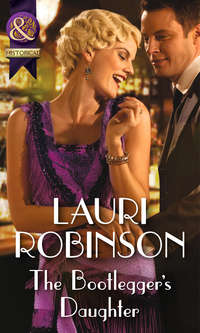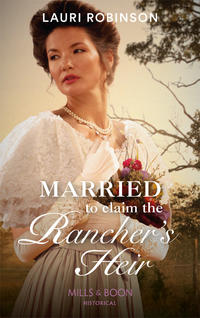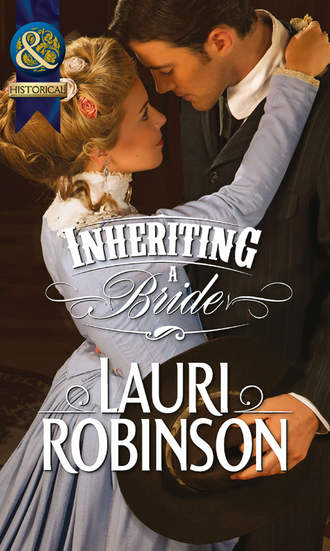
Полная версия
Inheriting a Bride
Henry climbed down, in an almost delicate and sissy way. His toes searched for the ground, and he didn’t let go of the saddle until both feet were safely planted. Tugging on the hat brim, as if it wasn’t already as low as it could go, he asked, “Your horse’s name is Andrew?”
“Yep, after Andrew Jackson, the seventh president of the United States.” A man didn’t know how sweet air was until he missed it, and Clay couldn’t seem to get enough. He led the horse closer to the pool, glorying in every deep breath.
“I kno—” Henry cleared his throat again. “I know who Andrew Jackson was.”
“Do you?”
“Y-yes.”
Justification took to wallowing in Clay’s mind. The sun had crested the mountains and was heating the air, but not the water. Even months from now, at the height of summer, it would still be icy cold. It really couldn’t be helped, though. He couldn’t ride for hours without breathing. Walking wouldn’t be any better and would double their travel time. Long ago he’d learned that when something needed to be done, it was best to jump in and get it over with. He’d known Henry for only a short time, but he’d learned a lot about him.
One, he stank, which said he didn’t like baths.
Two, he prickled easily, which meant he’d argue.
Three, he stank.
Clay flinched, thinking about what was to come, but he couldn’t stand here pondering all day. Taking a deep breath, he walked to the back of Andrew, patting the horse’s rump affectionately and trying to look casual.
Henry sidestepped, as if suspicious.
Clay shot out an arm, catching the kid by the collar.
“Hey! Let go!”
“I will in about three steps,” Clay assured him, grabbing the waistband of his britches with his other hand.
“Put me down!”
As promised, three steps later Clay let go, pitching the boy into the pond.
“You—” The resulting splash stifled Henry’s high-pitched protest.
Folding his arms, Clay watched the water swell up to engulf the youngster, hat and all. Henry would be mad enough to spit bullets when he surfaced, but at least he’d smell better.
Clay grimaced, feeling more than a little sorry for the boy. That water had to be bone-chillingly cold. Maybe he should have offered a deal—a bath for a ride to Black Hawk. Concern tugged at his conscience as the ripples slowly faded, but when the pond turned smooth and glassy, his heart slammed into his throat.
“Aw, shit!”
He didn’t bother to remove anything, just ran. When the water hit his thighs, he dived toward the exact spot where he’d pitched Henry.
Pin prickles of cold stung his eyes as he searched the murky depth. Catching a flutter, he reached out. His fingers snagged material and he tugged. Heading upward, he towed the kid, adrenaline pounding through Clay’s veins with every stroke of his arm and kick of his feet. His head broke the surface and he tugged harder, thrusting the kid above the waterline. The first thing he heard was spitting and sputtering.
Clay’s heart fluttered with thankfulness, and gasping for air himself, he shouted, “Why didn’t you tell me you couldn’t swim?” Holding Henry by the waist with one hand, he used the other arm to tread water, orientating himself by searching for the bank where Andrew stood.
“Why’d you try to drown me?” Henry shouted between sputters.
Clay kept one arm around the kid and used steady strokes with the other to pull them through the water. “I didn’t try to drown you.” They neared the shore and he lowered his legs. The slick soles of his boots slipped on the rocky bottom several times before he found solid footing. “I was giving you a bath.”
“A bath!” The kid’s squeaky voice sounded downright self-righteous.
Clay bent to pluck his hat out of the water, having lost it when he dived in. A thought occurred to him and he twisted, ready to get his first good look at Henry. Dumbfounded, he stared. The shabby hat, now black instead of dirt brown, with water dripping off the floppy brim, was still on the kid’s head.
As if he knew what Clay was thinking, Henry grabbed the brim with both hands and held on tight. The kid spun, an action that made it appear he was about to shoot back beneath the water. Clay caught the tail of the well-worn shirt and started walking toward the grass-lined bank.
Squirming and digging his heels into the creek bed, Henry fought him every step. Clay, shivering from the icy water and damn near steaming at the same time, gave a hard wrench to pull the kid out of the water.
A rip sounded and the cloth went slack.
“Aw, shit,” Clay mumbled. He hadn’t meant to tear the shirt off the boy’s back any more than he’d meant to drown him. His patience, though, was running thin. He spun and this time caught Henry around the waist. Hooking him next to his hip, Clay carried the kicking and squirming kid out of the water before they both ended up with pneumonia.
Andrew snorted and, with haughty horse eyes, looked at Clay as if he’d lost his mind. At that moment, he could have agreed with the animal. One-handed—not trusting the kid to stay put—he untied his bedroll.
“Here.” He lowered Henry so his feet touched the ground, and offered him a blanket at the same time.
The kid took a step back, head down and arms folded across his chest.
Clay flipped open the blanket, intending to drape it over the scrawny shoulders, but the boy took another step back and spun around. His shirt had ripped from hem to collar, straight up the back. The wet, frayed ends were stuck to wide strips of cloth wrapped around his torso.
A chill that had nothing to do with the temperature or his dripping clothes shivered up Clay’s spine. Along with it came a horrendous bout of ire. “Henry,” he asked, barely able to keep a growl out of his voice, “who beat you?”
“No one,” the kid answered gruffly.
Clay shook his head, disgusted with himself. The poor kid probably stank like he had due to a salve or poultice on his injuries. Why hadn’t he asked, instead of tossing the boy into the pond? He took a step closer. “I see the bandages, Henry.”
“Ban …” The kid’s arm twisted backward and his fingers searched the opening. “Those aren’t bandages,” he scoffed, flipping around. Drops of water dripped from his hat brim and plopped steadily onto his soaked, torn shirt.
Though he wanted to wrap the blanket around the kid, who was now visibly shivering with the after-effects of his icy dip, Clay didn’t move closer. Injured children were no different than injured animals. The thing to do was tread carefully, but firmly. “I know bandages when I see them.”
“They’re not bandages. Just give me the blanket.”
An odd sensation tickled Clay’s spine. Henry’s tone no longer held that note of gruffness. Actually, the way he stood, with one hand stretched out, the other folded across his chest, was like a woman shielding herself.
The shiver inching its way up Clay’s back turned into a fiery flash that all but snapped his spinal cord. “Tarnation,” he muttered, leaping forward to snatch away the floppy hat.
Wet strands of long hair fell in every direction, and squinting eyes full of fire and ice glared at him.
“It’s you!” he declared, as the fire reached his neck.
“Yes, Mr. Hoffman, it’s me,” Katherine Ackerman assured him. She stepped forward and grabbed the blanket from his hand, wrapping it around herself with a quick flip of her wrists. “I’ll probably end up with pneumonia, thanks to you.”
The woman before him looked nothing like the snooty canary he’d met at the station, and gazing at her now, sopping wet, in tattered boy’s clothes, with her mass of wet hair plastered to her head, Clay experienced a humorous rumble erupting. He pinched his lips to hold it in, but it burst from his chest with enough pressure that he had to toss his head back to let the entire bout of laughter out or else choke on it.
“I don’t find anything funny, Mr. Hoffman,” she screeched above his hooting.
“That’s because you’re not seeing what I’m seeing.”
Caught up in laughing, Clay didn’t see her move until it was too late. Pain shot up his shin from where the toe of her boot struck him. He hopped on one foot and grabbed his other leg, applying pressure to stop the stinging.
Knowing that only time would ease the ache, he let go, and turned around to discover her using his other blanket to sop the water from her hair. As she finger-combed the tresses and squeezed the ends with the blanket, he wondered how all that hair had fit under one floppy hat. Furthermore, how had he not noticed he was a she?
“What are you doing out here, Miss Katherine Ackerman from Boston, Massachusetts?”
“You know.” She bent, flipping her hair forward. The tresses almost touched the ground as she wrung them out with her hands and then shook them.
Moving away from the spray of droplets, he walked over to sit on a boulder and empty the water from his boots. “How would I know?”
Her hair made a graceful arch as she flipped her head up and turned to cast him a look—one of those glares that women produced and expected everyone to understand. And if truth were told, hers was quite adorable. Clay frowned at the thought, and went back to dumping water from one boot and then the other.
“You know I’m tracking Samuel Edwards.”
Her smugness, mixed in with that nasally accent, was charming. Clay stiffened and tugged on a boot. There was nothing about her, including her accent, that was charming, pleasant or even likable. She was like every other female gracing this earth—a conniving little imposter. This one even went so far as to dress up as a boy just to get her way.
Clay pulled on the other boot and stood. “Sam. His name’s Sam.” Walking across the grass, he didn’t stop until he stood right before her. “And you, Miss Katherine Ackerman from Boston, Massachusetts, are not tracking him.”
The way she sighed, the way she rolled her eyes, even the way she squared her shoulders irritated the pants off him, but her answer, “Yes, Mr. Hoffman, I am,” downright infuriated him.
“No, you’re not. If there’s anything you want to talk to Sam about, it goes through me.”
After an icy glare, she spun around.
“What do you want with him, anyway?”
She lifted her chin snootily and glanced over one shoulder. “That, Mr. Hoffman, is none of your business.”
He didn’t know if he wanted to insult her by laughing or by paddling her bottom. She deserved both. Instead he went with logic. “Tell me, Miss Ackerman, how do you plan to track him? You’ve lost your horse, have no supplies and …” he pointed a finger from her toes to her nose, wondering how to describe her appearance “… look like a cat caught in a downpour.”
“Thanks to you,” she spat.
“I’ll accept—” he looked her up and down pointedly “—your wet clothes are my fault, but I didn’t have anything to do with your horse.” He leaned closer to whisper, “It was probably the stench that got to him, too.”
“Oh,” she screeched, throwing the blanket off her shoulders.
The humor tickling his insides at her reaction faded. A moment later he wondered if she was being attacked by a swarm of insects, but then assumed, by the way she peered down the front of her shirt, searched the ground and patted her neckline, that she was looking for something.
“It’s gone.”
“What’s gone?” he asked.
“My pouch. It must have fallen off in the water.” She grabbed the blanket off the ground, furiously searching its folds.
Still unaffected, he made a halfhearted effort of glancing around. “What pouch?”
“It was a little bag, about this big.” She held up a thumb and forefinger. “And brown, with little beads on the string pulling it closed.”
“What was in it?” Now, almost wondering if it held the Ackerman family fortune, given the way she searched, he scanned the earth more seriously.
“It must be in the pond.” She spun, shooting past Andrew.
The horse snorted and sidestepped, blocking Clay’s pursuit. He shoved his way around the animal and caught her arm. “You aren’t going to find it in there.”
“I have to. It must have slipped off when I dived for my hat.”
“When you dived for your hat?”
“Yes, it was sinking almost faster than I could swim.”
Clay clutched her arm a bit more firmly. “You dived after your hat?”
Her gaze scoured the water, as if she could see into the depths below. “The pouch must have slipped off my neck then.”
“I thought you were drowning.” Clay wanted to shake her. He twisted her instead, so he could glare straight into her face, upturned nose and all. “I jumped in an ice-cold pond to save you, and you were chasing a sinking hat?”
“You jumped in to save me?”
“Yes,” he all but growled.
“Why?”
“Because I thought you were drowning.” His voice rose with each word.
“That was unnecessary. I’m a perfectly good swimmer,” she replied, as her gaze went back to the pond.
The ire eating inside him was wasted on this woman, as was any more time. He let go of her arm and strode toward Andrew.
“Where are you going?”
Ignoring the urge to reply, he picked up his blankets.
“Aren’t you going to get my pouch?”
Acting calm wasn’t too hard, not when it so obviously irritated her. He folded the blankets in half and then began to roll them up to fit behind the saddle.
“You can’t leave.”
A smile tugged at his lips. “Yes, Miss Katherine Ackerman from Boston, Massachusetts, I can.” He tucked the roll behind his saddle, securing it with the leather straps.
“But—but I can’t stay here, not without my pouch.”
The tremble in her voice had him turning around. Again he questioned, “What was in that pouch?”
She shrugged.
“Why is it so important?”
“Because it’s an amulet.” She glanced around and then whispered, “Without it … well, I could be attacked by mountain lions or bears.”
Laughing long and hard was in Clay’s near future, yet he held it in, considering the seriousness of her gaze. “Where’d you get it?”
“An Indian chief in Black Hawk,” she answered.
Running Bear, sitting on the front porch of Big Ed’s store, no doubt. The Indian would sell anything, including his medicine pouch, it appeared, to gain enough money to buy a few sticks of Adam’s Black Jack. The man, who was not a chief, was completely addicted to the licorice-flavored chewing gum. “Tell me, Katherine,” Clay started, a bit surprised at how easily her name rolled off his tongue. “How did he come about giving you the amulet?”
“I was at the general store, buying supplies for my …” she paused to glance around nervously “… adventure pursuing Mr. Edwards, and the owner of the store refused to sell me a gun.”
Clay held in the shudder rippling his shoulders. It appeared Big Ed wouldn’t go so far as to do just anything to make a sale. He’d have to remember to thank the man. A gun and Miss Katherine Ackerman from Boston, Massachusetts, would be a precarious pair. Lethal even. “Oh,” Clay said, while waiting for her to continue.
“Well, I was a touch miffed, you see.”
“A touch?”
“Well, a mite miffed.”
He nodded in agreement. As if a mite was more than a touch. What came next? A pinch? A bit? A tad?
“Yes, well,” she continued, “as I was leaving the building the chief was sitting on the porch. He, um, told me all about the lions and bears in this area. I asked him how his people have survived so long without being eaten by them.”
Bows and arrows, guns, knives, tomahawks, but mainly brains, Clay thought, but asked, “Oh? And what did he say?”
“He said they have secret ways. We talked a tad longer, and then he agreed to sell me an amulet that would repel bears and mountain lions.”
“A tad.” Clay nodded, knowing it would come up. It was hard to say if she was acting, or truly this gullible. Still dripping wet, she didn’t look to be a whole lot older than Sam, and nothing like the snooty woman at the train depot yesterday morning. “Tell me, did you look inside that little pouch?”
She cringed. “It didn’t smell very pleasant.”
“You don’t say?” Clay pressed a hand to the center of his forehead, right where it had started to hurt. Running Bear had probably put a dead fish in there. It was a wonder she hadn’t attracted bears and cats instead of repelling them.
Andrew let out a snort, and Clay turned to pat the animal’s neck. I know, boy. I know she’s loco. “Well, Katherine, Andrew and I have to get going. We’ll give you a ride back to Black Hawk, or you’re welcome to forge out on your own, chasing down Mr. Edwards, as you called him. It’s up to you.”
Kit was so engrossed in the way he said “Katherine,” not to mention quite enthralled that Clay Hoffman’s eyes were the exact same shade of blue as the bearded irises she’d planted near Gramps and Grandma Katie’s memorial stone, it was a moment or more before she realized he was waiting for her response, and then she had to pull up her acting voice. “Well, of course I’m returning with you. I couldn’t possibly remain out here without the amulet.”
The memory of the foul-smelling medicine bag was enough to make her shiver from head to toe. Yet she might need it again. The smell worked wonders in keeping others at bay, which was why she’d bought it.
She should be miffed at Clay for throwing her in the water as he had, but truth be told, it was amazing he’d stood the stench as long as he had. Of course, he didn’t realize she’d taken the pouch off last night and laid it near his side of the fire pit. She’d thought it would keep him on his side of the fire—which it had. Her initial fears had been more centered on coming across the fur-covered man in the wild, but a pompous gold-miner that held her livelihood in the palm of his hand was just as bad. That’s what Clay Hoffman was. And miners were a breed of their own—that’s what Grandma always said. Therefore Kit disliked every last one of them.
The man may have had Gramps duped, but his cocky grin and twinkling blue eyes couldn’t fool her. She’d have to deal with him, that was for sure, but first she had to learn exactly who Sam Edwards was, without Clay Hoffman learning she was Kit Becker and not Katherine Ackerman. If he discovered her identity, she might never learn the truth. She sighed. All in all, this was turning out to be far more complicated than she’d imagined.
He’d hoisted himself into the saddle and held out a hand. Given her choices, she took it, shoved a foot in the stirrup he made ready and climbed on the big roan behind him, barely flinching at the sting the movement caused. Squirming, making a more comfortable seat out of his jumbled bedroll, she grabbed the back swells of the saddle. “Ready, Mr. Hoffman.”
“Are you now?” he replied, sounding somewhat sarcastic.
Kit let it slide, just as she had most of his other comments. Now wasn’t the time. Besides, his eyes had told her more than his words had, anyway. Laughter had twinkled in those blue eyes at some of her exaggerated comments, and that reinforced how good of an actress she was. Of course, she’d never acted previous to this trip into the wilds of Colorado. But she was well-read. Books were her life, had taught her many things, including the importance of gaining the upper hand.
She wiggled a bit more. Her backside had taken to stinging again, and the bindings around her chest grew more and more uncomfortable. The strips of cotton were shrinking as they dried, no doubt, this being their first washing.
He twisted, tossed a quick glance over his shoulder, and she flashed him a grin, a syrupy one. Clayton Hoffman was not what she had expected. He couldn’t be much older than her, seven or eight years maybe, making him twenty-eight or twenty-nine. Much too young to be her grandfather’s partner. She’d truly anticipated an old geezer with one foot in the grave. A cringe had her sending up a silent plea, No offense, Gramps.
The smile that formed on her lips was real. She could hear his answer.
None taken, Kitten.
If Clayton Hoffman wasn’t sitting right in front of her, she might have talked to Grandpa Oscar a bit. Asked him how he and Grandma were getting along up there in heaven. But since now wasn’t the time or place, she was content just to smile, glad she still had this connection with the people who had raised her and loved her with great devotion. Grandpa Oscar’s trips to Colorado had been tough on Grandma Katie. She’d always fretted something terrible the entire time he was gone, and a piece of Kit was happy they were now together for eternity.
“So, Miss Katherine Ackerman from Boston, Massachusetts, how do you know Sam?”
She bit her lips, holding in mirth at just how ridiculous the name sounded when he said it like that. Katherine Ackerman had been her birth name, but she’d never been to Boston. “I don’t know him,” she answered, pulling up her best actress voice. It had taken practice to acquire a Bostonian accent. A woman she’d met on the train from Chicago to Denver had been her inspiration, and pride welled at how she was able to sound just like the woman had. She’d mastered it as well as the rough voice she’d used for her Henry disguise. “I want to meet him.”
Clay Hoffman repositioned his hat before he asked, “Why?”
“Because I want to meet a miner.” This particular miner, to whom, for some unknown reason, Gramps willed one half of his estate. It was all so frustrating. Sam’s name had never been spoken in her presence, nor a second partner ever mentioned. Clay Hoffman was a different matter. Gramps had talked nonstop about him.
“Sam’s not a miner,” he said.
His back had stiffened, as if he was bracing himself for her argument, and though she did want to insist Sam was a miner, and she would meet him, Kit bit her tongue to keep from arguing. Once back in Black Hawk, she’d just rent another horse and search for him again. Of course, she’d have to come up with another disguise.
“I read a playbill on the train, about the opera house in Nevadaville,” she said, aloud. “Does it really seat four hundred people?” Having read the advertisements on the train could prove beneficial. Gramps had never mentioned the opera house, but they must certainly have a wardrobe full of costumes, and Nevadaville was only five miles from Black Hawk, by train.
“Yes, why?” he answered, sounding skeptical, almost angry.
“Boston has several wonderful opera houses, and I’m curious what one in the wilds of Colorado would look like.” That sounded plausible, didn’t it? Surely Boston had an opera house. Chicago did, and she truly enjoyed watching the plays. If that silly horse she’d rented hadn’t run off, she wouldn’t be worrying whether Boston had opera houses or not. She’d be finding out exactly who Sam Edwards was.
The best laid plans of mice and men, she quoted silently, pressing a hand to her temple. Once she knew the truth, she could decide what to do. The only thing that made sense was that Grandpa had another family. One not even Grandma knew about. It was unfathomable, yet why else would Gramps have included Sam in the will, and at the same amount as her? Clay Hoffman seemed as protective over Sam’s identity as Gramps’s solicitor, Mr. Watson.
It appeared no one wanted Kit to know the truth.
“So, Miss—”
Interrupting Clay, not done contemplating her thoughts, she leaned forward and whispered, “You don’t think there’s a bear or mountain lion following us, do you?”
Chapter Two
His back stiffened again and Kit swore she saw his neck quiver slightly.
“No, I don’t believe there are any bears or mountain lions following us. They are few and far between in this area.”
Gramps had never mentioned the animals, so she figured they weren’t an issue, yet he hadn’t mentioned Sam, either. “I sure do wish we’d found my amulet,” she whispered.
“I’m sure the chief will sell you another.”
She puffed out her cheeks, really wishing for a moment of quiet. “Oh, do you think so?” She’d come up with bears and mountain lions off the top of her head. A woman from Boston would be afraid of such things and believe an amulet from a chief would save her—and it had proved useful. Once in Black Hawk she’d ask the old Indian if he had another one. It had cost only a package of chewing gum. He’d been the one to tell her if she put a dead fish in it no one would come close to her, and had even told her where to find the fish.


